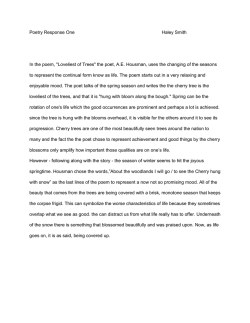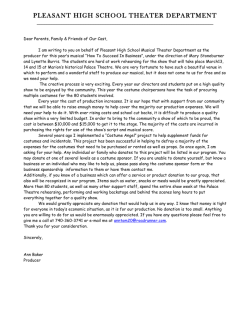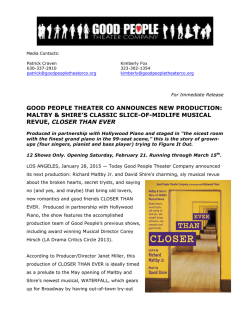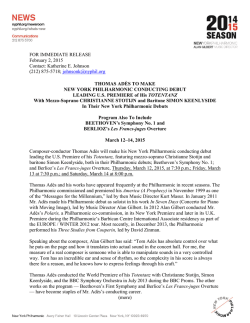
Poet and Peasant Overture - Louisiana Philharmonic Orchestra
Louisiana Philharmonic Orchestra: Sound Education 02.02.15 Title: Poet and Peasant Overture Time Frame: 30 minutes Overview: Students will listen to one of Franz von Suppé's most famous overtures and answer a series of questions about the aesthetic qualities of the work. Standard: Historical and Cultural Perspective: Recognize great composers and their most significant musical works (M-HP-E5, M5, H5); Artistic Perception: Understand and apply advanced music vocabulary to describe aesthetic qualities of musical compositions (M-AP-H1). Franz von Suppé April 18, 1819 – May 21, 1895 Franz von Suppé [Franz von su-pay] is mostly known for his overtures, but while he was alive, he was the eminent composer of Viennese operetta and light concert music. Suppé's parents were unsupportive of a musical career despite the early talent their son displayed for composition. Despite this, Suppé sought out instruction from a local bandmaster and a cathedral choirmaster. Regardless of Suppé's growing skill as a composer, his father sent him to Padua at the age of sixteen to study law, though he continued his musical studies during this time. He also came into contact with an already famous distant relative, Gaetano Donizetti, who took an active part in the young man’s development as a composer. After studying in Italy, Suppé returned to Austria and made his way to the musical capital of the Germanic world—Vienna. Once in Vienna, he was eventually appointed as conductor at the Theater in der Josefstadt. Though the post was without pay, Suppé secured an opportunity to present his own operas there. Despite his successful career as a composer of light music, Suppé's works are but little known today with only a few exceptions. Those exceptions, however, such as Boccaccio and the overtures to Poet and Peasant and Light Cavalry are some of the most easily recognized pieces in classical music. (Bio via http://www.classicalconnect.com/composer/Franz-von-Supp%25C3%25A9) Poet and Peasant Overture has remained much more famous than the opera it was composed for. Now, this work often appears in cartoons (it’s used in two different episodes of Popeye cartoons) and on pops concerts. The overture, as music critic Cecelia H. Porter noted, “is a dazzling hodgepodge of sentimental tunefulness (as in the solo cello), boisterous masses of orchestral forces, and ebullient rhythms.” Do you recognize the melody in the cello solo? It’s actually nearly an exact match to the start of the folk song "I've Been Working on the Railroad", which was published in 1894 (Poet and Peasant Overture was composed in 1846)! A reference to the Poet and Peasant Overture is made in Kate Chopin’s novel The Awakening, which takes Louisiana Philharmonic Orchestra: Sound Education 02.02.15 place in New Orleans and Grand Isle, Louisiana. Twin children perform the overture as a piano duet for a group of their mother’s friends. Listening and Activity Listen to this recording of Poet and Peasant Overture while students consider the following questions (https://www.youtube.com/watch?v=Fj10e8iD5Jg): (Starting from the B section: http://youtu.be/Fj10e8iD5Jg?t=3m44s) • This overture opens with a brass chorale followed by a lyrical cello solo. Then the bombastic main theme enters. How does the contrasting bombastic section compare aesthetically to the peaceful opening? • Can you hear the lilting Viennese waltz played near the middle of the piece (http://youtu.be/Fj10e8iD5Jg?t=5m15s)? What aesthetic reason would the composer have had in the 19th century to include a waltz? Which part sounds like the peasant and which like the poet? Why? Why do you think this overture has remained popular while the operetta it was written for is no longer performed? • • You can hear the LPO perform Poet and Peasant Overture at a free concert, New Orleans and the Spanish World, presented in collaboration with The Historic New Orleans Collection on Wednesday, February 4th at 7:30 PM at St. Louis Cathedral. The performance will also be streamed live on the LPO website, lpomusic.com! Louisiana Philharmonic Orchestra: Sound Education 02.02.15
© Copyright 2026


!["Minho - Le Nord" [no. 1 "Old Land Portugal"] - Free](http://s2.esdocs.com/store/data/000459019_1-763f6c95acdaf20bb3a9381d878beb51-250x500.png)


